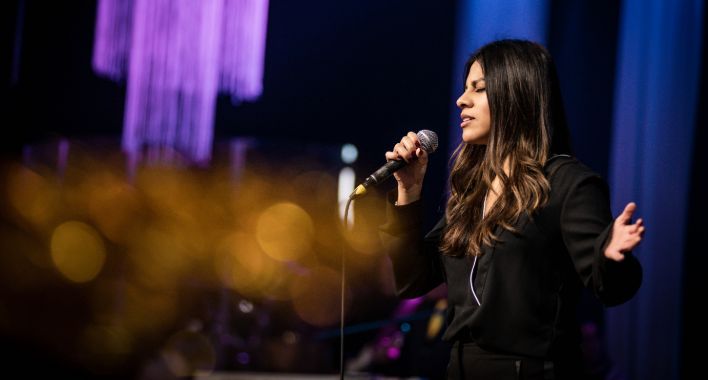Many people wonder how music and feelings relate to each other and why songs have such a powerful effect on our emotions. Whether we are music fans or not, we all know that most songs are, by their lyrics, what we normally call “love songs.” We also know that we often identify with what these songs say and relate to it to something we are going through. Why is that?
It is not strange for this to happen and part of the musical experience consists of understanding in depth how music and feelings relate to each other. After all, the so-called love songs talk about very relatable and basic themes, very visceral and one that anyone can share. Their lyrics are basically about the process of falling in love and what happens to us during a breakup, and they do so in ways that are usually simple, and easily conveyed.
Lyrics are usually a simple type of literature, rather than strictly literary, which is more elaborate and complex. In addition, the music that accompanies them serves as a way to express themselves more powerfully, because it greatly increases the emotional power of the words. It provides them with a tone, an intensity that verbal communication alone doesn’t have.

To see how music and feelings relate to each other, we can experiment with many songs, some of them very popular and well-known: the lyrics, when simply read, seem beautiful but rather “simplistic”. However, when accompanied by music, the piece gains enormous power as a declaration of love or lack of love.
The relationship between music and feelings
We are often (somewhat) aware of what we feel but we have not been able to verbalize it yet and this absence of words blurs the clarity of our feelings. It prevents us from understanding the full meaning of what is happening to us.
Sometimes songs provide us with words and we experience they fit with the emotion we are feeling, even seizing us, at a given moment. Then, once we have taken that step, our emotional experience goes deeper, it becomes complete. We say “That’s it, that’s exactly how I feel”.
That is why songs can serve as ready-made “cards” which help us express our sentimental experience, especially if we don’t have much ability to put it into words, but also when our linguistic ability is more advanced.
That happens both because of the message of the lyrics and to the extent it is accompanied by its music because when we use a song to express what we feel, the music also gives a tone to the feeling: it dresses it up and complements it. This is what the traditional dedicated song sections on the radio are based on, for example: Through this song, I want to express how I feel about you. Or, if things are not going so well anymore, I want to send you a little message with this song, where I will express it better than with my own words.
Individual or collective feelings?
All of our experiences are shared and that’s why we can express them, understand what happens to others and make ourselves understood because it has happened to us too: we too have loved, longed for, desired, hated, felt let down, disregarded, valued or cheated. However, being honest, when we feel bad, we don’t care if everyone else’s heart has been broken: now it has been broken for us and there is no comfort for that because the heart that hurts us is our own, the heart that has been broken now is ours, not theirs.
Emotions are what they are and it’s is the same for all human beings. In that sense, the experience of one person is shared by others. However, we each experience joy, sadness, desire, or frustration in our way. Each person hurts in their own way, or rejoices in their own way: that is already a private, particular experience. We can express it verbally and non-verbally, but others cannot feel our love, admiration, nostalgia, joy, or melancholy.
In reality, they have to believe us through what they see in us and through what we tell them, and they will understand us to the point that they can compare it with their own experiences. That is, when we tell others that we love someone, they can imagine what it is about, they have to remember their own experience of love and compare it. However, they cannot know (feel) exactly what we are talking about, they are not in our body feeling it. They can only imagine, relate to it and empathize with us through their own experiences.

What do we look for in heartbreak songs?
Everyone knows why they listen to these types of songs deliberately or repetitively and how the music relates to the feelings they are experiencing. There may be several reasons.
Sometimes we feel like our emotions get “bottled up” and sad songs help us stir them up and be able to express them to let off steam. Sometimes we need to “rekindle” ourselves in a melancholic environment because that is what is in line with our internal state. There are also people who are looking for when they feel this way is to disconnect from those painful emotions and induce another state of mind through cheerful songs.
Of course, it’s not about looking for empathy in songs. Empathy is offered to us by another person, not by a song. Songs do not listen to us, nor do they detect our needs or solve them within the context of a relationship. It is people who do that.
Either way, if we are lucky, and by listening to “heartbreak” or breakup songs we can feel some relief, either by connecting with sadness or disconnecting from it. It’s as if a piece inside us falls into place and we understand how music relates to feelings.
What we’ve learned about love through music and feelings
If we are to be self-critical, we must realize how love songs have shaped in us a distorted idea about this feeling and about what relationships are like.
Although this is slowly changing, most of the cultural expressions (songs, movies, advertising, etc.) that we have experienced throughout our lives are based on the narrative of “romantic love”, which includes a series of concepts and symbols that make us have certain expectations about romantic relationships.
There is the better half, Cupid’s arrows, “broken” hearts, euphoria, alliances, and of course, a certain language that refers to a brutal intensity in feelings, an extreme level of commitment and unity with the other, and a categorization of the other as unique and irreplaceable for us.
All that is in the vast majority of songs of any genre. It is part of what we would consider our “sentimental education”, or how music and feelings have interact in the way we’ve incorporated certain beliefs about relationships. Without a doubt, it is not very good education, because it does not correspond to real experiences and this ends up generating a lot of confusion, bewilderment, and frustration.
Songs, which are almost equivalent to saying “love songs”, contribute to our construction as beings who think, feel, and act. They are one of the factors, but not the only one. Let’s not forget that our real experiences also provide us with very important learning, but we turn to them and interpret them according to the belief system we already have and have been shaping since our childhood.
This system of beliefs about what love is, what a relationship should be like, who the other person is and what to expect from them, who I am for the other person, what we have to put into the relationship and how to behave… can be modified throughout our lives. Many people change it to the extent that what they are living does not correspond to what they expected or what they see in the movies or hear in songs.
With or without songs, the most important thing is our psychological well-being and the quality of our relationships: those that exist, those that we wish to exist, and those that are already part of the past. If you feel that, for some reason, your well-being is harmed by this issue, it is a good opportunity to work on it.
We hope this article on music and feelings has been of interest to you. Log on to our chat and we will explain how you can start a therapy session with one of our experienced psychologists today to put that music and its lyrics back on track.









